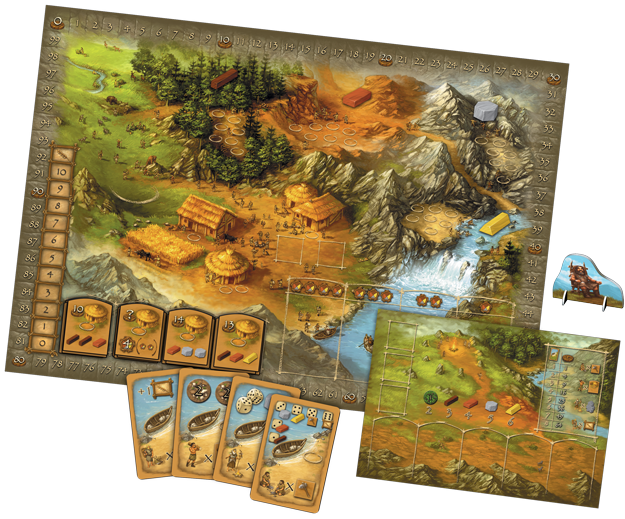A week or so ago I wrote a blog piece about hype, looking at why games are forgotten so quickly in this hobby. One major reason is that aforementioned hype, and getting swept along on the wave of The Cult of the New. The other though, in my opinion, is the crazy rate of progress and evolution in board games.

Do the Evolution
“Evolution?!“, I hear you scoff. “What evolution? We’re still throwing dice, flipping cards, and moving bits of plastic and wood on a board“. While that is certainly true, I’d also argue that the quality of the things we’re doing with those physical parts, is advancing at a rate which is seldom seen in other hobbies. Let me try to quantify that.
If you head to a video game forum, group or subreddit, and ask for recommendations for a particular genre, you’ll notice a couple of things. Firstly, You’ll get some shouts for the big new game, whatever that might be, but you’re also more likely to get recommendations for games that are at least a few years old. Ask for a shooter and you’re likely to have Counter-Strike: GO, Overwatch or Fortnite suggested. A competitive sport game might have Rocket League thrown your way. RPG recommendations will see Skyrim, Mass Effect2, Divinity Original Sin, Fallout 4, World of Warcraft mentioned. Games anywhere from five to ten years old, but still played daily.
Now knock on the door of a board game community and ask for recommendations for a worker placement game, or a heavy euro. Or a gateway game. The chances are you’re going to find recommendations From the last year or two. This begs the question – what’s wrong with the games from five or ten years ago? Or perhaps a better question is:
What makes newer games better than the older ones?
It’s a tricky question to answer. Partially it’s about availability. Some games go out of print and it makes them difficult to find, so naturally it makes more sense to look for a game you’re likely to be able to find. The real reason the more recent games get recommended though, is because they’re better.
Beauty is in the eye of the beholder, I know, and saying one game is objectively better than another is a pretty ballsy claim to make. In this case though, I think it’s true. Looking for a Dungeon Crawler? Gloomhaven, or Jaws of the Lion. Tableau Builder? Wingspan. Worker Placement? A Feast for Odin. Maybe you have more specific needs. You want a cutesy animal themed game? Everdell. Space horror action? Nemesis. What about the classics – something like an abstract game? Azul, The Isle of Cats, Sagrada.

For the record, none of those are just my opinion. These are the most popular answers from going back through months of recommendation requests in various groups. Why are these the games people are recommending? Here’s my take.
Games are getting better. And they’re getting better quickly.
The resurgence of board games in the last ten years is amazing. Popularity is booming, the scene is growing, and so is the amount of money being spent. Small publishers can get their games to market with services like Kickstarter, and there are a lot more designers making a name for themselves. It’s led to the systems and mechanisms being used in games to be continually refined. Along with this we’ve seen the emergence of online playtesting groups, grants, incentives, competitions, and rapid prototyping with software like Tabletop Simulator and Tabletopia.
As an illustration of iteration and continuous improvement, the things we do in board games are getting refined, year on year. I’ll use Worker Placement as an example, as it’s my favourite mechanism. Worker placement has gone from quite basic games like Stone Age, through to games like A Feast For Odin, where a huge choice of worker spots is combined with polyomino tile laying. The same mechanism has been used in new ways in very recent games too, like Dune Imperium or The Lost Ruins of Arnak, both of which combine it with deck-building instead of abstract puzzles.

If you asked me if I wanted to play Stone Age, I’d never turn you down, but if you asked me to choose a worker placement game, I’d choose something like Nusfjord, Paladins of the West Kingdom or Everdell. Not overly complex games, but just more fun. More interesting. Ten years ago if you asked for a miniatures game, you’d have had Claustrophobia thrown at you, Hersoscape, or Descent. Now though, it’ll be Nemesis, Mechs vs Minions, Lords of Hellas. Quality is improving, and expectations are raising alongside it.
A Golden Age
We’re living in a real Golden Age for board games, card games, and tabletop games of all kinds. Production qualities are through the roof for the big releases, and at the other end of the spectrum small box games are getting self-published through Kickstarter and other crowdfunding sites. Classic games are getting the rules and artwork revisited and re-balanced. Most importantly though, designers are building on their own experience, and on building on the foundations laid by the greats like Dr Reiner Knizia, Vlaada Chvátil, Friedmann Friese, Alan R Moon etc, and they’re coming up with ways to keep games feeling fresh, new, improved – just ‘better’.
This, combined with the recent groundswell of support for better inclusion and diversity in our hobby – at all levels – means the future’s looking brighter than ever, and I can’t wait to see what the next ten years bring.
Adam is a board game critic with over 15 years of experience in the hobby. A semi-regular contributor to Tabletop Gaming Magazine and other publications, he specialises in heavyweight Euro games, indie card games and transparency in board game media.

